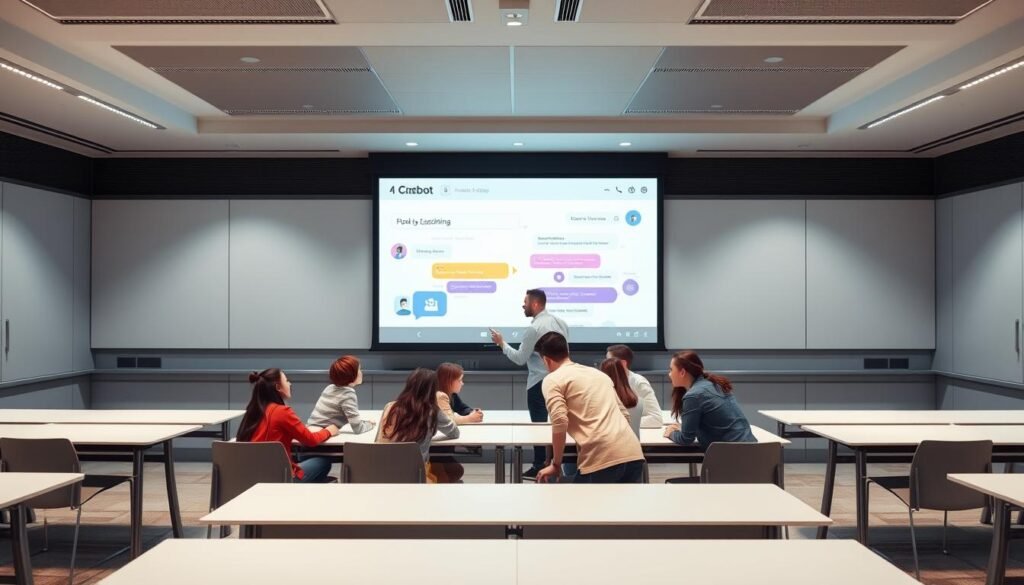Did you know that 73% of students would welcome AI-powered support in their learning journey? The advent of chatbot technology in education is reshaping how students engage with educational resources. These intelligent digital assistants are transforming online learning support by offering instant, personalized assistance 24/7.
Educational institutions are swiftly embracing chatbot technology in education to elevate student experiences. Chatbots are now essential in modern educational settings, providing answers to complex queries and personalized learning guidance.
The Rise of Chatbots in Online Education Support marks a significant advancement in digital learning strategies. Students now have immediate, intelligent support that caters to their unique learning needs. This innovation breaks down traditional communication barriers between learners and educational resources.
Key Takeaways
- Chatbots provide 24/7 personalized educational support
- AI technology is transforming student interaction with learning resources
- Instant access to information improves student engagement
- Chatbots offer scalable and cost-effective educational assistance
- Personalized learning experiences are now more accessible
Understanding Chatbots in Education
Chatbot technology is transforming education by revolutionizing student interactions with learning platforms. These intelligent digital assistants are redefining traditional educational experiences. They offer instant, personalized support to learners in various academic settings.
AI chatbots for student support represent a groundbreaking approach to addressing educational challenges. They act as virtual companions, answering questions, providing guidance, and enhancing the learning process.
Exploring Chatbot Fundamentals
Chatbots are software programs designed to mimic human conversation. In educational contexts, they utilize advanced algorithms to:
- Provide instant student support
- Answer frequently asked questions
- Guide students through complex processes
- Offer personalized learning recommendations
Diverse Types of Educational Chatbots
Educational institutions are adopting various chatbot models to improve student experiences:
- Rule-Based Chatbots: Follow predefined conversation paths
- AI-Powered Chatbots: Learn and adapt through machine learning
- Hybrid Chatbots: Combine rule-based and AI capabilities
Each chatbot type offers distinct advantages in educational technology. They help institutions create more responsive and interactive learning environments.
Benefits of Chatbots for Students
Chatbots are transforming online education with innovative solutions, enhancing student learning experiences. The advantages of chatbots in online learning are evident as educational technology evolves.
Students benefit from intelligent digital assistants that support their academic journey. Chatbots make online education more responsive and personalized, creating better learning environments.
24/7 Access to Information
Today’s students require instant access to educational resources. Chatbots provide real-time support by:
- Answering questions immediately
- Providing study materials around the clock
- Reducing wait times for academic assistance
Platforms like virtual education platforms are incorporating chatbot technologies. This ensures students can access vital information anytime.
Personalized Learning Experiences
Artificial intelligence empowers chatbots to craft tailored learning paths for each student. These systems analyze:
- Individual learning styles
- Academic performance
- Knowledge gaps
Chatbots understand each student’s unique needs. They recommend specific resources, exercises, and strategies to enhance educational outcomes.
Enhancing Communication with Chatbots
Digital communication in education has undergone a significant transformation with the advent of chatbot tools for academic support. These intelligent systems are revolutionizing how students interact with educational resources and institutions.
Chatbots are creating unprecedented opportunities for seamless communication in virtual learning environments. They provide students with immediate access to critical information and support.
Instant Support for Common Queries
Students often face challenges navigating complex academic processes. Chatbots offer rapid solutions by addressing common questions with precision:
- Course registration details
- Assignment submission guidelines
- Academic schedule inquiries
- Technical support for online platforms
Bridging Communication Gaps
The impact of chatbots on virtual learning environments extends beyond simple query resolution. These tools create an accessible and judgment-free communication channel between students and educators.
By providing 24/7 support, chatbot tools for academic support eliminate time constraints and geographical barriers. Students can receive instant guidance without feeling intimidated or hesitant to ask questions.
Educational institutions are increasingly recognizing the potential of these intelligent communication platforms to enhance student engagement and streamline academic interactions.
Improving Administrative Efficiency
Chatbot technology is transforming educational administration, enabling institutions to manage tasks more efficiently. By integrating chatbots into remote education support, schools and universities can significantly alter their operational processes.
Intelligent chatbot systems streamline complex tasks, reducing manual labor. These digital tools offer substantial advantages across various administrative areas.
Automating Routine Administrative Tasks
Modern educational chatbots are adept at managing repetitive administrative duties. Their capabilities include:
- Managing student enrollment inquiries
- Scheduling automated appointment reminders
- Processing basic technical support requests
- Directing student communication efficiently
Reducing Administrative Workloads
Chatbots automate standard interactions, freeing administrative staff to tackle more strategic tasks. Intelligent automation leads to fewer manual interventions and enhanced productivity.
Educational institutions can save considerable time, with chatbots handling up to 80% of routine communications. This enables human resources to focus on complex problem-solving and personalized student support.
The future of educational administration hinges on smart, responsive technology. It promises to create seamless experiences for both staff and students.
Driving Engagement through Chatbots
Digital learning environments are undergoing a significant transformation with the advent of chatbot technology. The integration of chatbots into online education has emerged as a potent strategy to foster student engagement and motivation. This innovation ensures that students remain actively involved and motivated throughout their educational journey.
Chatbots are revolutionizing the interaction between students and educational content, creating dynamic and interactive learning experiences. Their impact on virtual learning environments transcends traditional teaching methodologies, offering a more engaging and adaptive approach to education.
Interactive Learning Sessions
Modern educational chatbots introduce engaging learning opportunities through various interactive features:
- Personalized quiz experiences
- Real-time language conversation practice
- Adaptive learning modules
- Instant feedback mechanisms
Students can now explore interactive learning platforms that are tailored to their individual learning styles and pace. This personalized approach enhances the learning experience, making it more effective and enjoyable.
Keeping Students Motivated
Chatbots play a vital role in sustaining student motivation by offering:
- Personalized encouragement
- Progress tracking
- Timely learning reminders
- Gamified learning experiences
By fostering a supportive and responsive learning environment, chatbots ensure that students remain engaged and committed to their educational objectives. This dedication to student motivation is a cornerstone of effective online education.
Challenges of Implementing Chatbots

The advent of chatbots in online education support heralds a new era, yet their integration is fraught with challenges. Educational institutions face a myriad of technical and ethical hurdles. These obstacles must be meticulously addressed to ensure the successful deployment of AI chatbots for student support.
Understanding Technical Limitations
Despite the rapid advancement of chatbot technology, current systems still grapple with significant limitations. These AI tools often falter when confronted with:
- Complex academic queries demanding a deep, nuanced understanding
- The task of interpreting contextual or emotional student communication
- Addressing highly specialized subject matter
Studies in educational technology underscore the necessity for continuous development. They emphasize the need to enhance chatbot comprehension and response accuracy. For further insights, refer to recent research on AI chatbots in.
Ensuring Data Privacy and Security
Protecting student data is of utmost importance when integrating AI chatbots. Educational institutions must establish stringent safeguards to safeguard sensitive information. Key considerations include:
- Implementing encryption protocols
- Establishing clear data usage policies
- Regularly updating security measures
Transparency and trust are fundamental when integrating AI chatbots into educational platforms. It is imperative that both students and administrators have confidence in the management and protection of their data.
Success Stories: Chatbots in Action
Educational institutions globally are witnessing profound transformations with the integration of chatbot tools for academic support. These advanced technologies are reshaping online learning landscapes by offering tailored, immediate assistance to students.
Prestigious universities worldwide have adopted cutting-edge chatbot solutions, showcasing the significant advantages of these tools in online education. Let’s delve into some compelling case studies:
Real-World Implementation Examples
- Arizona State University reduced student inquiry response times by 70% using AI-powered chatbots
- Stanford University improved student engagement through 24/7 personalized academic support
- Georgia Tech enhanced student onboarding processes with intelligent virtual assistants
Student Perspectives
Students widely express positive sentiments towards educational chatbots. Sarah Martinez, an online graduate student, noted, “The chatbot facilitated instant navigation through complex course registration processes, saving me hours of potential frustration.”
These narratives underscore the role of chatbot technologies as more than mere technological advancements. They are pivotal tools in crafting more inclusive, responsive, and student-focused learning environments.
Future Trends in Chatbot Technology

The realm of chatbot technology in education is witnessing a rapid transformation, introducing innovations that promise to revolutionize online learning. Artificial intelligence is continually expanding the capabilities of chatbots, enabling them to offer more intelligent and responsive educational support.
Emerging trends in chatbot technology are reshaping digital learning environments through groundbreaking technological advancements. Students can now anticipate more sophisticated and intuitive interactions with AI-powered educational assistants.
AI Advances Transforming Learning Support
Significant developments in chatbot technology are transforming educational support:
- Advanced natural language processing enables more nuanced communication
- Machine learning algorithms adapt to individual student learning styles
- Predictive analytics provide personalized educational recommendations
Integrated Educational Technologies
The future of chatbot technology in education appears promising with potential integrations:
- Virtual reality learning environments
- Augmented reality interactive study platforms
- Advanced learning management systems
These technological convergences will create more immersive and responsive educational experiences. They will make learning more engaging and accessible for students worldwide.
How to Implement Chatbots in Your Institution
Integrating chatbots into remote education support necessitates a strategic framework. Educational institutions can revolutionize their digital learning environments by adopting AI-powered communication tools. The advent of chatbots in online education has opened up new avenues for schools to improve student engagement.
The process of implementing chatbots starts with a detailed institutional evaluation. Identifying your educational needs is crucial for selecting the most suitable solution. It is essential to assess your current communication systems and pinpoint areas where chatbot technology can offer significant support.
Key Deployment Steps
- Conduct a thorough needs assessment
- Research compatible chatbot platforms
- Develop clear implementation goals
- Create training programs for staff
- Plan gradual technology integration
Selecting the Right Chatbot Solution
When selecting a chatbot platform, several critical factors must be considered:
- Scalability: Ensure the solution can grow with your institution
- Customization: Look for platforms that match your specific educational requirements
- User-friendliness: Select intuitive interfaces for students and staff
Institutions can delve into advanced options by examining expert resources like chatbot implementation strategies. This will help optimize their digital learning support systems.
Budget considerations are paramount. Smaller institutions might begin with basic solutions, whereas larger universities could opt for more advanced AI-driven platforms. The goal is to strike a balance that maximizes educational value.
Conclusion: The Future of Chatbots in Education
The advent of chatbots in virtual learning environments marks a significant transformation in online education. Educational institutions are quickly realizing the potential of these intelligent technologies to revolutionize student support, engagement, and administrative tasks. By adopting digital learning innovations, schools can craft more responsive and adaptive educational experiences.
Chatbot trends in online education show immense potential for personalization and accessibility. These advanced systems allow students to receive immediate support, access information at any time, and navigate tailored learning paths. Institutions that adopt these technologies are likely to witness enhanced student satisfaction, reduced administrative burdens, and superior educational outcomes.
The technological landscape is constantly evolving, necessitating adaptability from educational organizations. Integrating chatbots is more than a technological upgrade; it’s a strategic move to align with modern learners’ expectations. By investing in these intelligent systems, schools can foster more dynamic, engaging, and student-focused learning environments.
As artificial intelligence progresses, chatbots will become even more advanced. Educational leaders who actively explore and implement these technologies will lead the charge in digital learning innovation. They will prepare students for a future heavily influenced by technology.
